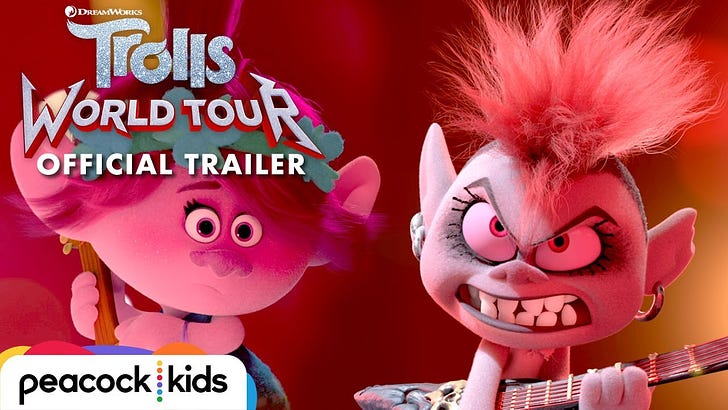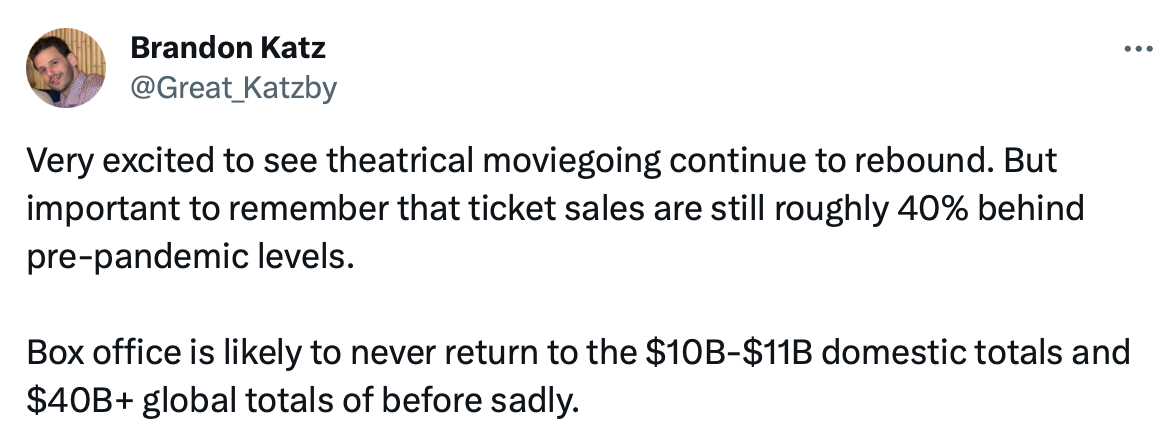DreamWorks in The Pandemic: The Little Studio That Could
Theaters are back*! Yes for Paramount Pictures with Top Gun: Maverick and Sonic the Hedgehog 2. Yes for Marvel with Doctor Strange in the Multiverse of Madness. Finally, yes for DreamWorks Animation with The Bad Guys.
*Per below “Back” is still “post-COVID back.” Ticket sales remain 30–40% below pre-pandemic levels.
We need to take a moment to appreciate DreamWorks here. The company’s journey throughout the pandemic has been wild. Although the box office performance for The Bad Guys isn’t groundbreaking, it’s nice. It’s solid. From a business perspective, the execution has been blissfully straightforward: decent overachievement at theaters for its opening weekend; originally projected at $20m, it hit closer to $24m. Charting dependably in box office rankings six weeks in; worldwide take-home currently stands at more than $200m. A tidy distribution of worldwide release dates now efficiently bringing home the bacon. And notably, no last-minute decision drama required on prompt streaming windows. The new normal of content distribution is upon us. But let's not forget that DreamWorks teams were at the forefront of all this, pluckily juggling ride-or-die business assessments for the past two years.
March 2020: COVID hit
It all started in March 2020 (a statement that could open many stories), when DreamWorks found its franchise sequel Trolls World Tour subject to arguably the messiest business moment in cinema history. The studio was elbow deep in an expensive theatrical marketing campaign, with lucrative toy lines set in stores, when a global pandemic came knocking. As the COVID crisis built in intensity, it was clear that the theatrical business was going to take a major hit.
Hotly anticipated Bond film No Time to Die was the first pole to fall, promptly followed by the whole tent. The nearly completed movie was pushed back wholesale, from a would-be plum release slot of Easter weekend to November. DreamWorks wasted no time reacting, pulling Trolls World Tour up two weeks, to the newly vacated Bond slot on Good Friday. As the world continued to tumble in more ways than one, the studio announced another change just two weeks later. The film would have a day-and-date release on premium video on demand (PVOD) for $19.99. This industry-changing move immediately upset decades-old exclusivity agreements with cinemas, alongside talent deals. Controversial with a capital C, but since the theatrical marketing machine was already engaged, I guess the idea would have been a mix of:
A) Throwing all options at a bad situation
B) Using a unique moment to trial something that had been whispered about in Hollywood for years.
The complex negotiations required to push any deal through would have been impossible to conclude in the timelines available. DreamWorks acted, fully backed by parent company NBCUniversal. Stuck at home, executives likely modeled the related scenarios at their kitchen tables.
Jeff Shell, CEO of NBCUniversal, said that the decision was intended to give cinema-goers more options for home entertainment, with theaters mainly closed and the focus being on restricting the spread of the virus. The industry braced for impact, as society braced for more. Movie ticket sales were as abysmal as expected, but immediately digital download metrics pinged at historic levels.
A few weeks later, presumably to QED his experiment, Shell would release a statement saying that:
“The results for ‘Trolls World Tour’ have exceeded our expectations and demonstrated the viability of PVOD. As soon as theaters reopen, we expect to release movies on both formats.”
Wall Street Journal would report that the final revenue generated by the endeavor entirely outstripped that of the original Trolls movie’s theatrical run. It’s inconceivable that monetization in subsequent distribution windows wouldn’t have been damaged, but in the most difficult of spots, the experiment was worth the skin. And theaters knew it.
Corporate ballistics flew as AMC Theatres boss Adam Aron spat back at NBCUniversal. In an open letter, AMC issued an outright ban on releasing any Universal films “under the current terms.” The “war of words” escalated to “deadly struggle,” with other cinema chains bailing on, alongside a couple of trade bodies for good measure.
Once calm prevailed, and the reality of the extended lockdown situation took hold, a deal was struck. AMC would allow NBCUniversal the option of short PVOD windows going forward. DreamWorks had won. The new precedent earned a victory for all major Hollywood studios.
November 2020: The Second Lockdown
The wisdom of this landscape shift would come in handy for the next DreamWorks franchise sequel. The Croods: A New Age would hit theaters over Thanksgiving weekend in November 2020—typically fertile theatrical distribution real estate under normal circumstances, neutered, as it was, by partial COVID lockdown. Importantly, DreamWorks would invoke the shorter PVOD window allowed, strategically bringing the movie into U.S. homes for the Christmas period. This approach worked surprisingly well (by pandemic standards). The film had the highest U.S. box office tally since the start of COVID. It would go on to deliver steady ticket sales for more than 13 weeks after release.
By the new year, COVID numbers began to soar again and another extended lockdown loomed. DreamWorks made the decision to push The Boss Baby 2: Family Business back from its March 2021 release date.
Let’s appreciate how matrixed the DreamWorks media distribution landscape looks. Output deals with Netflix, Hulu, Peacock, and the likes of Sky in Europe feed TV content derived from franchises with films hitting cinemas. This has an innate marketing efficiency, as big theatrical promotional campaigns will give halo uplift to streaming series. Of course the flipside of this is that in a machine of many cogs, when one stops working there’s impact throughout.
At the time, The Boss Baby boasted excellent forward momentum as a franchise. The first smash hit movie in 2017 promptly spawned a successful Netflix streaming series that ran for four seasons. As is common practice, the series was due a refresh in terms of story. A buzz refresh from some tangential theatrical marketing would also be very welcome.
Summer 2021: Brighter Days but Not Over Yet
After some back and forth The Boss Baby 2: Family Business hit 4th of July weekend in the U.S. Once again, the theatrical-VOD model was rewritten, and the film would have a concurrent window for premium users of NBCUniversal’s own streaming service, Peacock. Whilst theatrical performance was challenged, the streaming numbers showed promise. A spin-off from the film, Netflix original series The Boss Baby: Back in the Crib would be in production at the same time.
The challenges would extend further, as one of DreamWorks’ other streaming success stories needed to swallow some unpleasant medicine. A return to cinemas for the Spirit franchise, truly reborn from its streaming series on Netflix, was ultimately doomed by the tricky landscape. Releasing in June 2021, the $42m box office attained barely pulled a chin over the $30m production budget.
So that brings us back to The Bad Guys. A “solid” performance after the twists and turns of the last two years is likely to be very welcome at DreamWorks. A “nice” return so far, with more dividends potentially to come if the film begets sequels and derivatives, building to franchise status. It feels like the terms “solid” and “nice” have undergone a value revival through recent years.
Content serving kids and families is often considered niche, yet it can act as the canary in the coal mine, as well as the pointy end of the stick poking seismic industry change along. The theatrical model was truly disrupted by the actions of DreamWorks during the pandemic. Showing the protectiveness and responsibility kids media folks feel towards their audience, DreamWorks president Margie Cohn said of the initial Trolls decision:
“To see families stuck at home, and that this big event movie was going to be available to watch, made it feel like we were doing something to help. I was calling agents and telling them this. Everyone thought it was a good idea. No one was saying, ‘What’s in it for me? What about my bonus?’ It felt like the right property at the right time.”
Right indeed. A series of nail-biting decisions gloriously vindicated, I would argue. At the same time, key competitor in the animation space Pixar was doing things very differently. The comparison warrants a whole different article entirely.




